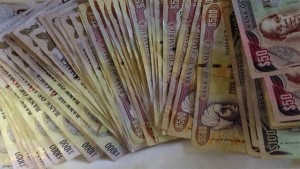 KINGSTON, Jamaica, Friday May 13, 2016 – Workers will be going home with more money in their pockets from July, and even more from next April , as the Jamaica Labour Party (JLP) fulfills a campaign promise of billions in income tax relief – later than announced, but now benefitting an additional 113,000 people who were not expecting breaks under the original plan.
KINGSTON, Jamaica, Friday May 13, 2016 – Workers will be going home with more money in their pockets from July, and even more from next April , as the Jamaica Labour Party (JLP) fulfills a campaign promise of billions in income tax relief – later than announced, but now benefitting an additional 113,000 people who were not expecting breaks under the original plan.
Delivering his Budget presentation yesterday, Finance Minister Audley Shaw said the income tax threshold would move from J$592,000 (US$4,816) to J$1 million (US$8,137) across the board from July 1, and then increase further to J$1.5 million (US$12,205) on April 1, 2017. “We are extremely pleased that one of the first and very important measures this new government has now enacted is to grant tax relief to hardworking Jamaicans,” he told Parliament, pointing out that the Andrew Holness administration was delivering even more than promised.
“We said 118,000 people would benefit from this PAYE [Pay As You Earn] tax exemption measure. Right now there are 426,000 people on the PAYE roll, 129,000 roughly already are off of it because they are below J$592,000 (US$4,816). In making this a threshold for everybody…it will now be 251,000 people that will benefit,” Shaw added, noting that thousands of other self-employed people will now benefit from the raising of the current PAYE threshold.
Shaw said the Government was “acting on its philosophy and belief that Jamaicans are much better at spending their hard-earned money than the Government, so Government should take as little direct income tax as possible”. Meantime, he also disclosed that workers who earn more than J$6 million (US$48,824) annually would see their tax rate move up to 30 per cent from 25 per cent. However, Shaw explained that persons captured in that increase would actually be paying a 27.5 per cent rate since they will also benefit from the increased threshold.
The JLP had promised before the February 25 polls, that if elected to office, it would scrap income tax for everyone earning less than J$1.5 million (US$12,205) from April 1. However, Shaw later said the start date would have to be delayed since it was discovered that the anticipated source of funding – revenue earned from the increase in gas tax – which would have made up for the reduction in income tax revenue had been used up by the previous administration.
The tax breaks announced by the Finance Minister will cost government J$12.5 billion (US$101.8 million), but he outlined a list of increased taxes in other areas to make up the shortfall. They include: a J$7 (US$0.06) per litre increase in the Specific Consumption Tax on petrol; the introduction of a Special Consumption Tax on LNG and revision of heavy fuel oil regime which will result in an increase in electricity bills; and an increase in Special Consumption Tax on cigarettes from J$12 (US$0.10) per stick to J$14 (US$0.11) per stick. All those measures take effect from today.
Additionally, from June 1, departure tax will more than double, moving from US$14 to US$35. “If you want to move from poverty to prosperity, everybody has to be on board in a more productive society, and that is what the story is all about,” the Finance Minister said after announcing the revenue measures.
